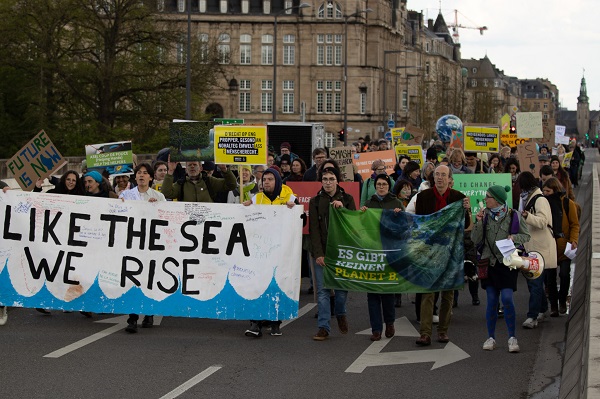 Credit: CELL
Credit: CELL
On Monday 22 April 2024, a collective of local civil society organisations held an Earth Day march in Luxembourg City.
According to the organisers, 450 people walked together, from Luxembourg Railway Station (Gare) to the Chamber of Deputies (Luxembourg's parliament), to recall the importance of preserving the Earth.
The collective behind this initiative was composed of the following civil society organisations: Afrilanthropy, ASTI, ASTM, ATD Quart Monde Luxembourg, Caritas Luxembourg, CELL, Cercle de Coopération des ONGD, Commission luxembourgeoise "Justice et Paix", Coup de pouce, Ëmweltberodung Lëtzebuerg, Eurosolar Lëtzebuerg, Erwuessebildung, etika, Fairtrade Lëtzebuerg, FdH, Findel+, Fondation Partage Luxembourg, Foodsharing Luxembourg, Forum, Fondation pour l’accès au logement (within "Oneplanetluxemburg"), Friddens- a Solidaritéitsplattform, Gaialux, Greenpeace Luxembourg, Jugendrot/CGJL, Julie Conrad Design Studio, Klima-Bündnis Lëtzebuerg, Life, Megaphone, OGBL, ProVelo, Seniors for Climate Luxembourg, SOS Faim Luxembourg, Transition Minett, Up Foundation and Wecitizens.
Together, they presented a list of demands requesting that the Luxembourg government "take the necessary measures to make our lifestyles and our societies more resilient and sustainable". They asked the government to "make a consistent commitment to an ambitious and just transition for Luxembourg, in particular by strengthening efforts to preserve biodiversity and water resources". By supporting local and environmentally friendly agriculture, they also demanded "healthy food for all", as well as the "rapid" exit from fossil fuels and strengthening the development of renewable energy.
"Luxembourg's responsibilities in climate terms go beyond its borders," the organisations continued. "This is why we are asking for a fair contribution to losses and damages for the most vulnerable countries impacted by climate change."
Moreover, the collective called on Luxembourg's commercial sector to "favour fair relations that respect the environment and the principle of food sovereignty", for example by promoting fair trade. They also urged Luxembourg to commit to adopting "effective" and "robust" legislation on the duty of vigilance of companies. They added that a "responsible financial sector is essential for a sustainable future".
The collective called for an ecological transition that is "socially just", i.e. one that includes vulnerable groups in the decision-making process and that protects those who are most exposed to climate change. "Participatory, inclusive governance, encouraging citizen participation and setting up climate policy evaluation bodies, can enable the success of the ecological transition," they elaborated.
Last but not least, the collective urged Luxembourg to "commit to integrating climate protection and sustainable development into educational programmes and to cooperating with civil society organisations to raise awareness and mobilise citizens."








